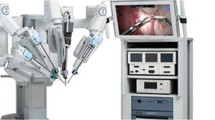Abstract
Introduction
Laparoscopic rectal resection (LRR) has not gained the same acceptance as laparoscopic segmental colonic resection because of technical challenges, increased operating time and costs, and concerns about the oncological outcome.
Discussion
One way to overcome these challenges is by standardizing the laparoscopic technique in the same way as has been done with the open rectal cancer surgery. We have established a standardized, stepwise laparoscopic procedure for rectal resections that enhances the transformation of laparoscopic skills, identifies indications for conversion early in the operation, and makes the operation predictable and reproducible for the whole surgical team.
Conclusion
We believe this saves time in the operating room and builds up laparoscopic team expertise.




Similar content being viewed by others
References
Cohen SM, Wexner SD. Laparoscopic colorectal resection for cancer: the Cleveland Clinic Florida experience. Surg Oncol. 1993;2(Suppl 1):35–42. doi:10.1016/0960-7404(93)90057-6.
Kim LH, Chung KE, AuBuchon P. Laparoscopic-assisted abdominoperineal resection with pull-through (sphincter saving). Surg Laparosc Endosc. 1992;2(3):237–240.
Morino M, Parini U, Giraudo G, et al. Laparoscopic total mesorectal excision: a consecutive series of 100 patients. Ann Surg. 2003;237(3):335–342. doi:10.1097/00000658-200303000-00006.
Duluq JL, Wintringer P, Stabilini C, et al. Laparoscopic rectal resection with anal sphincter preservation for rectal cancer: long-term outcome. Surg Endosc 2005;19(11):1468–1474. doi:10.1007/s00464–005–0081–1.
Leung KL, Kwok SP, Lam SCW, et al. Laparoscopic resection of rectosigmoid carcinoma: Prospective randomized trial. Lancet 2004;363:1187–1192. doi:10.1016/S0140-6736(04)15947-3.
Breukink S, Pierie J, Wiggers T. Laparoscopic versus open total mesorectal exicion for rectal cancer (Review). Cochrane Database Syst Rev 2006; (4):CD005200.
Jayne DG, Guillou PJ, Thorpe H, et al. Randomized trial of laparoscopic assisted resection of colorectal carcinoma: 3-year results of the UK MRC CLASSIC trial group. J Clin Oncol. 2007;25:3061–3068. doi:10.1200/JCO.2006.09.7758.
Kuhry E, Schwenk WF, Gaupset R, Romild U, Bonjer HJ. Long-term results of laparoscopic colorectal cancer resection. Cochrane Database Syst Rev 2008;(2):CD003432.
Senagore AJ, Duepree HJ, Delaney CP, et al. Results of a standardized technique and postoperative care plan for laparoscopic sigmoid colectomy. A 30-month experience. Dis Colon Rectum. 2003;46:503–509. doi:10.1007/s10350-004-6590-5.
Delaney CP, Kiran RP, Senagore AJ, et al. Case matched comparison of clinical and financial outcome after laparoscopic or open colectomy. Ann Surg. 2003;238:67–72. doi:10.1097/00000658-200307000-00009.
Braga M, Frasson M, Vignali A, et al. Laparoscopic resection in rectal cancer patients: Outcome and cost-benefit analysis. Dis Colon Rectum. 2007;50:464–471. doi:10.1007/s10350-006-0798-5.
Delaney CP. Low anterior resection. In: van Heerden F et al., editors. Operative techniques in general surgery. Philadelphia: Saunders; 2003. p. 214–223.
Kariv Y, Delaney CP, Senagore AJ, et al. Clinical outcome and cost analysis of a “fast track” postoperative care pathway for ileal pouch-anal anastomosis: a case control study. Dis Colon Rectum. 2007;50(2):137–146. doi:10.1007/s10350-006-0760-6.
Senagore AJ, Delaney CP. A critical analysis of laparoscopic colectomy at a single institution: lessons learned after 1000 cases. Am J Surg. 2006;191:377–380. doi:10.1016/j.amjsurg.2005.10.039.
Kim SH, Park IJ, Joh YG, et al. Laparoscopic resection for rectal cancer: a prospective analysis of thirty-month follow-up outcomes in 312 patients. Surg Endosc. 2006;20(8):1197–202. doi:10.1007/s00464-005-0599-2.
Maslekar S, Sharma A, MacDonald A. Mesorectal grades predict recurrences after curative resection for rectal cancer. Dis Colon Rectum. 2006;50:168–175. doi:10.1007/s10350–006–0756–2.
Quirke P, Dixon MF. The prediction of local recurrence in rectal adenocarcinoma by histopathologic examination. Int J Colorectal Dis. 1988;3:127–131. doi:10.1007/BF01645318.
Quirke P, Dixon MF. The prediction of local recurrence in rectal adenocarcinoma by histopathologic examination. Int J Colorectal Dis. 1988;3:127–131. doi:10.1007/BF01645318.
Birbeck KF, Macklin CP, Tiffin NJ, et al. Rates of circumferential resection margin involvement vary between surgeons and predict outcomes in rectal cancer surgery. Ann Surg. 2002;235(4):449–457. doi:10.1097/00000658-200204000-00001.
Nagtegaal ID, Marjinen CA, Kranenbarg EK, et al. Circumferential resection margin involvement is still an important predictor of local recurrence in rectal carcinoma: not one millimetre but two millimetres is the limit. Am J Surg Pathol. 2002;26(3):350–357. doi:10.1097/00000478-200203000-00009.
Wibe A, Rendedal PR, Svensson E, et al. Prognostic significance of the circumferential resection margin following total mesorectal excision for rectal cancer. Br J Surg. 2002;89:327–334. doi:10.1046/j.0007-1323.2001.02024.x.
Guillou PJ, Quirke P, Thorpe H, et al. Short term endpoints of conventional versus laparoscopic-assisted surgery in patients with colorectal cancer (MRC CLASSIC trial):Multicentre, randomised controlled trial. Lancet 2005;365:1718–1726. doi:10.1016/S0140-6736(05)66545-2.
Tekkis PP, Senagore AJ, Delaney CP, et al. Evaluation of the learning curve in laparoscopic colorectal surgery: comparison of right sided and left sided resections. Ann Surg. 2005;242(1):83–91. doi:10.1097/01.sla.0000167857.14690.68.
Casillas S, Delaney CP, Senagore AJ, et al. Does conversion of a laparoscopic colectomy adversely affect patient outcome? Dis Colon Rectum. 2004;47(10):1680–1685. doi:10.1007/s10350–004–0692–4.
Lindsetmo RO, Champagne B, Delaney CP. Laparoscopic rectal resections and fast track surgery: what can be expected? Am J Surg 2009;197:408–412.
Author information
Authors and Affiliations
Corresponding author
Rights and permissions
About this article
Cite this article
Lindsetmo, RO., Delaney, C.P. A Standardized Technique for Laparoscopic Rectal Resection. J Gastrointest Surg 13, 2059–2063 (2009). https://doi.org/10.1007/s11605-009-1033-1
Received:
Accepted:
Published:
Issue Date:
DOI: https://doi.org/10.1007/s11605-009-1033-1




